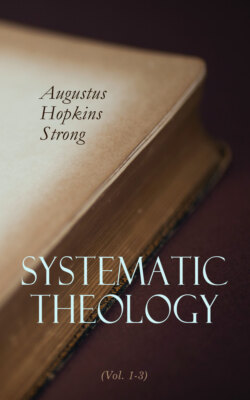Читать книгу Systematic Theology (Vol. 1-3) - Augustus Hopkins Strong - Страница 90
На сайте Литреса книга снята с продажи.
4. The Dynamical Theory.
ОглавлениеThe true view holds, in opposition to the first of these theories, that inspiration is not simply a natural but also a supernatural fact, and that it is the immediate work of a personal God in the soul of man.
It holds, in opposition to the second, that inspiration belongs, not only to the men who wrote the Scriptures, but to the Scriptures which they wrote, so that these Scriptures, when taken together, constitute a trustworthy and sufficient record of divine revelation.
It holds, in opposition to the third theory, that the Scriptures contain a human as well as a divine element, so that while they present a body of divinely revealed truth, this truth is shaped in human moulds and adapted to ordinary human intelligence.
In short, inspiration is characteristically neither natural, partial, nor mechanical, but supernatural, plenary, and dynamical. Further explanations will be grouped under the head of The Union of the Divine and Human Elements in Inspiration, in the section which immediately follows.
If the small circle be taken as symbol of the human element in inspiration, and the large circle as symbol of the divine, then the Intuition-theory would be represented by the small circle alone; the Dictation-theory by the large circle alone; the Illumination-theory by the small circle external to the large, and touching it at only a single point; the Dynamical-theory by two concentric circles, the small included in the large. Even when inspiration is but the exaltation and intensification of man's natural powers, it must be considered the work of God as well as of man. God can work from within as well as from without. As creation and regeneration are works of the immanent rather than of the transcendent God, so inspiration is in general a work within man's soul, rather than a communication to him from without. Prophecy may be natural to perfect humanity. Revelation is an unveiling, and the Röntgen rays enable us to see through a veil. But the insight of the Scripture writers into truth so far beyond their mental and moral powers is inexplicable except by a supernatural influence upon their minds; in other words, except as they were lifted up into the divine Reason and endowed with the wisdom of God.
Although we propose this Dynamical-theory as one which best explains the Scripture facts, we do not regard this or any other theory as of essential importance. No theory of inspiration is necessary to Christian faith. Revelation precedes inspiration. There was religion before the Old Testament, and an oral gospel before the New Testament. God might reveal without recording; might permit record without inspiration; might inspire without vouching for anything more than religious teaching and for the history, only so far as was necessary to that religious teaching. Whatever theory of inspiration we frame, should be the result of a strict induction of the Scripture facts, and not an a priori scheme to which Scripture must be conformed. The fault of many past discussions of the subject is the assumption that God must adopt some particular method of inspiration, or secure an absolute perfection of detail in matters not essential to the religious teaching of Scripture. Perhaps the best theory of inspiration is to have no theory.
Warfield and Hodge, Inspiration, 8—“Very many religious and historical truths must be established before we come to the question of inspiration, as for instance the being and moral government of God, the fallen condition of man, the fact of a redemptive scheme, the general historical truth of the Scriptures, and the validity and authority of the revelation of God's will which they contain, i.e., the general truth of Christianity and of its doctrines. Hence it follows that while the inspiration of the Scriptures is true, and being true is a principle fundamental to the adequate interpretation of Scripture, it nevertheless is not, in the first instance, a principle fundamental to the truth of the Christian religion.” Warfield, in Presb. and Ref. Rev., April, 1893:208—“We do not found the whole Christian system on the doctrine of inspiration. … Were there no such thing as inspiration, Christianity would be true, and all its essential doctrines would be credibly witnessed to us”—in the gospels and in the living church. F. L. Patton, Inspiration, 22—“I must take exception to the disposition of some to stake the fortunes of Christianity on the doctrine of inspiration. Not that I yield to any one in profound conviction of the truth and importance of the doctrine. But it is proper for us to bear in mind the immense argumentative advantage which Christianity has, aside altogether from the inspiration of the documents on which it rests.” So argue also Sanday, Oracles of God, and Dale, The Living Christ.
